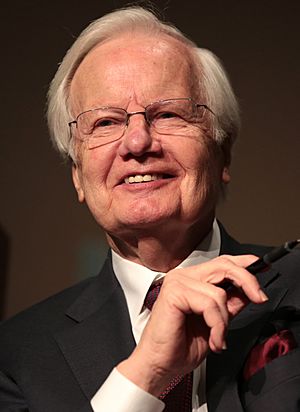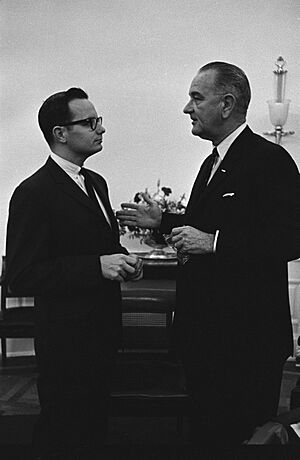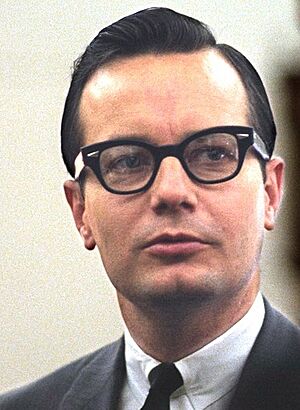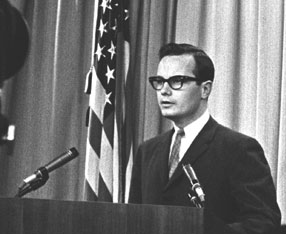Bill Moyers facts for kids
Quick facts for kids
Bill Moyers
|
|
|---|---|

Moyers in 2017
|
|
| 11th White House Press Secretary | |
| In office July 8, 1965 – February 1, 1967 |
|
| President | Lyndon B. Johnson |
| Preceded by | George Reedy |
| Succeeded by | George Christian |
| White House Chief of Staff | |
|
De facto
|
|
| In office October 14, 1964 – July 8, 1965 |
|
| President | Lyndon B. Johnson |
| Preceded by | Walter Jenkins (de facto) |
| Succeeded by | Jack Valenti (de facto) |
| Personal details | |
| Born |
Billy Don Moyers
June 5, 1934 Hugo, Oklahoma, U.S. |
| Died | June 26, 2025 (aged 91) New York City, U.S. |
| Political party | Democratic |
| Spouse |
Judith Davidson
(m. 1954) |
| Children | 3 |
| Education |
|
Billy Don Moyers (June 5, 1934 – June 26, 2025) was an American journalist and political commentator. He worked as the eleventh White House Press Secretary from 1965 to 1967. This was during the time Lyndon B. Johnson was president. Moyers also served as a top advisor to President Johnson from 1964 to 1965.
Moyers was involved with the Council on Foreign Relations and the Bilderberg Meeting. He also worked as a TV news commentator for ten years. He was very active in public broadcasting, creating many documentaries and news shows. He won many awards for his investigative journalism and community work. Moyers was known for speaking out about how big companies influenced news in the United States.
Contents
Early Life and Education
Billy Don Moyers was born on June 5, 1934, in Hugo, Oklahoma. His parents were John Henry Moyers and Ruby Johnson Moyers. He grew up in Marshall, Texas.
Moyers started his journalism career at age 16. He was a young reporter at the Marshall News Messenger newspaper. In college, he studied journalism at the North Texas State College. In 1954, he worked for U.S. Senator Lyndon B. Johnson during a summer campaign. He later managed Johnson's personal mail.
Moyers then moved to the University of Texas at Austin. There, he wrote for The Daily Texan newspaper. In 1956, he earned a Bachelor of Arts degree in journalism. While in Austin, Moyers also worked as an assistant news editor for KTBC radio and television stations. These stations were owned by Lady Bird Johnson, Senator Johnson's wife.
From 1956 to 1957, he studied in Scotland at the University of Edinburgh. In 1959, he earned a Master of Divinity degree from the Southwestern Baptist Theological Seminary. Moyers also served as a Baptist pastor in Weir, Texas. He was a top aide to Senator Johnson during his 1960 presidential campaign.
Working in Government
Helping Create the Peace Corps
President John F. Kennedy started the Peace Corps in March 1961. The Peace Corps sends American volunteers to other countries to help with development. Bill Moyers and Sargent Shriver worked hard to get the money needed to start the organization. The Peace Corps Act became law on September 22, 1961.
Moyers later said that the Peace Corps was "a way of being in the world." He also said that his years at the Peace Corps were "the best years of our lives." Moyers worked as an associate director and deputy director for the Peace Corps. In November 1963, he became a special assistant to President Lyndon B. Johnson.
Starting Public Broadcasting
Moyers played a key role in creating the public broadcasting system. In 1961, a government official named Newton N. Minow called television "a vast wasteland." He wanted TV to offer more programs that helped the public. The Johnson administration then studied this idea.
Moyers was part of a committee that looked into noncommercial educational television. This committee released a report in 1967. Moyers said that public television became "a central part of the American consciousness." He helped create the law that followed the committee's ideas. In 1967, President Johnson signed the Public Broadcasting Act of 1967. This law encourages public radio and television for learning and culture.
Working for President Johnson
When Lyndon B. Johnson became president after President Kennedy's death, Moyers became a special assistant. He worked for Johnson from 1963 to 1967. Moyers was the last person alive who was in the famous photograph of Johnson's swearing-in ceremony.
Moyers helped organize Johnson's "Great Society" programs in 1964. He was also a main planner for Johnson's 1964 presidential campaign. Moyers was Johnson's informal chief of staff from October 1964 to July 1965. From July 1965 to February 1967, he also served as White House press secretary.
After a staff member resigned, President Johnson asked Moyers to look into the backgrounds of some political opponents. Moyers later said his memory was unclear about why Johnson asked for this. Moyers also approved a famous negative advertisement called the "Daisy Ad" during the 1964 campaign. This ad is seen as the start of harsh negative campaign ads today.
Journalist Morley Safer wrote in his book that Moyers and President Johnson met with Safer's boss at CBS. They were upset about Safer's reporting on the Vietnam War. Moyers said that Safer's claims were made because Moyers had reported tough stories about conservative presidents later on.
In 1966, Moyers said about working for President Johnson: "I work for him despite his faults and he lets me work for him despite my deficiencies." Moyers left the White House earlier than expected. This was partly because he had approved a speech by the Secretary of Defense that upset President Johnson.
In 1967, Moyers said that Johnson saw the Vietnam War as his main legacy. He felt that continuing the war would divide the country. Moyers and Johnson remained in contact even after Moyers left the White House.
Journalism Career
Working at Newsday
Moyers was the publisher for the Newsday newspaper from 1967 to 1970. This newspaper had not been doing well. Moyers made it more progressive, bringing in famous writers and adding more investigative reporting. The newspaper's sales went up, and it won 33 major journalism awards, including two Pulitzer Prizes.
However, the owner of the paper, Harry Guggenheim, was conservative. He did not like the newspaper's liberal direction under Moyers. They disagreed over the 1968 presidential election. Moyers resigned a few days after Guggenheim sold his share of the paper.
Working at CBS News
In 1976, Moyers joined CBS News. He worked as an editor and main reporter for CBS Reports until 1981. Then, he was a senior news analyst for the CBS Evening News from 1981 to 1986. He was the last regular commentator for the network's main news show. In his last year at CBS, Moyers spoke about news standards declining at the network. He did not renew his contract, saying he had commitments with PBS.
Working at NBC News
Moyers briefly joined NBC News in 1995 as a senior analyst. The next year, he became the first host of MSNBC's Insight program. He was the last regular commentator on the NBC Nightly News.
Working at PBS
Bill Moyers Journal (1972–1981)
In 1971, Moyers started working for the PBS. His first PBS series was called This Week with Bill Moyers.
Bill Moyers Journal was on PBS from 1972 to 1981. He later hosted a show with the same name from 2007 to 2010. In 1975, Bill Moyers Journal showed a documentary about a difficult event in Rosedale, Queens. It showed the reactions of a group of black girls who experienced the event.
Individual Programs (1982–2006)
From 1982 to 2006, Moyers produced and hosted 70 different documentaries and interview series on PBS. These were often made by Moyers and his wife, Judith Suzanne Davidson Moyers. They formed a company called Public Affairs Television in 1986.
Frontline (1990–1999)
Between 1990 and 1999, Moyers produced and hosted seven episodes of the PBS journalism program Frontline. These episodes covered topics like toxic waste, the Gulf War debate, and campaign finance.
NOW with Bill Moyers and Wide Angle (2002–2005)
Moyers hosted the TV news show NOW with Bill Moyers on PBS for three years, starting in 2002. He left the program in December 2004. He returned to PBS soon after to host Wide Angle in 2005. When he left NOW, he said he wanted to finish writing a book about Lyndon B. Johnson.
Bill Moyers Journal (2007–2010)
On April 25, 2007, Moyers returned to PBS with Bill Moyers Journal. In the first episode, "Buying the War," Moyers looked into how the media reported on the lead-up to the Iraq War. This episode won an Emmy Award in 2008. On November 20, 2009, Moyers announced he would retire from his weekly show on April 30, 2010.
Moyers & Company (2012–2015)
In August 2011, Moyers announced a new weekly interview show called Moyers & Company. It started in January 2012. Moyers also launched his website, BillMoyers.com, that same month. The show was praised for bringing news and views not often seen in commercial media. The program ended on January 2, 2015.
Moyers on Democracy Podcast
In 2020, Moyers started a series of podcasts called Moyers on Democracy. He had conversations with different people about topics like the Post Office and racism in American society. The series ended in early 2021.
Awards and Recognition
In 1995, Bill Moyers was added to the Television Hall of Fame. He also won the Walter Cronkite Award for Excellence in Journalism that year. In 2006, he received a Lifetime Emmy Award. The award recognized his dedication to exploring important issues and ideas. It also noted the high quality of his broadcasts.
Moyers received 26 Emmy nominations and won 13 of them. He also won many other major television journalism prizes. These included a gold baton from the Alfred I. duPont-Columbia University Awards and a Peabody Award. He is a member of the American Academy of Arts and Letters. He also received many honorary degrees from universities.
Conflict Over Content
In 2003, the chairman of the Corporation for Public Broadcasting (CPB), Kenneth Tomlinson, said that NOW with Bill Moyers was not balanced. In 2005, Tomlinson ordered a study of the show without telling the CPB board. The study was done by someone Tomlinson chose, who had a conservative background.
Tomlinson said the study supported his view that NOW had a "left-wing bias." Some people agreed, saying PBS looked like a "liberal monopoly." However, a poll in 2003 found that 80 percent of Americans thought PBS was "fair and balanced." Moyers said he invited Tomlinson to discuss the issue on TV, but Tomlinson did not respond.
On November 3, 2005, Tomlinson resigned from the CPB board. This happened after a report found that he had broken rules. The report said he interfered with a new public affairs program. It also suggested he used "political tests" when hiring for the CPB.
In 2006, the PBS Ombudsman said that Moyers was back and that the conflict had a "chilling effect." Moyers said that if you fight for what you believe in at PBS, you can survive, but it is not easy.
Organizations and Personal Life
Moyers was a director of the Council on Foreign Relations from 1967 to 1974. He was also a member of the steering committee for the Bilderberg Group. From 1990, he was president of the Schumann Center for Media and Democracy.
Moyers married Judith Suzanne Davidson, a producer, on December 18, 1954. They had three children and five grandchildren. His daughter, Suzanne Moyers, is an author. His son, William Cope Moyers, is a spokesman for addiction recovery. He wrote books about his experiences. His other son, John Moyers, helped start an online public affairs journal. Moyers lived in Bernardsville, New Jersey, for many years.
Death
Bill Moyers passed away on June 26, 2025, in New York City. He was 91 years old. Many people shared their thoughts on his passing. Journalist Dan Froomkin called Moyers "one of the greatest of the greats." Senator Bernie Sanders said Moyers was "a friend, public servant, and outstanding journalist."
Published Works
- Listening to America: A Traveler Rediscovers His Country (1971)
- The Secret Government: The Constitution in Crisis: With Excerpts from an Essay on Watergate (1988), coauthor Henry Steele Commager; looks at the Iran-Contra affair
- The Power of Myth (1988), host: Bill Moyers, author: Joseph Campbell
- A World of Ideas: Conversations with Thoughtful Men and Women About American Life Today and the Ideas Shaping Our Future (1989)
- A World of Ideas II: Public Opinions from Private Citizens (1990)
- Healing and the Mind (1993)
- The Language of Life: A Festival of Poets (1995); conversations with 34 poets
- Genesis: A Living Conversation (1996)
- Sister Wendy in Conversation with Bill Moyers: The Complete Conversation (1997)
- Fooling with Words: A Celebration of Poets and Their Craft (1999)
- Moyers on America: A Journalist and His Times (2004); selected speeches and commentaries
- Moyers on Democracy (2008)
- Bill Moyers Journal: The Conversation Continues (2011)
Images for kids
See also
 In Spanish: Bill Moyers para niños
In Spanish: Bill Moyers para niños
 | Laphonza Butler |
 | Daisy Bates |
 | Elizabeth Piper Ensley |





